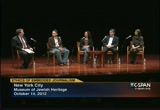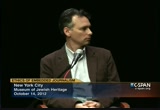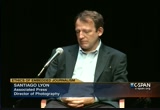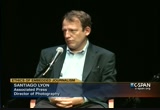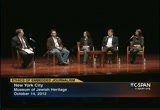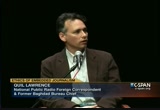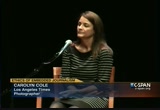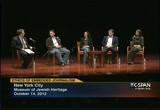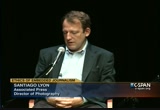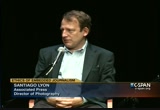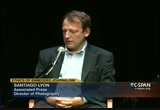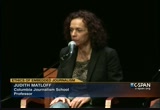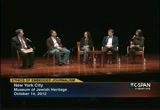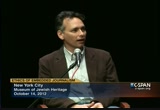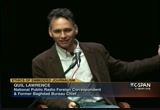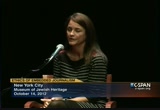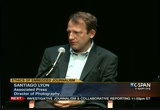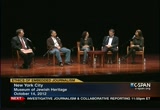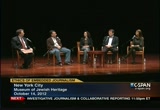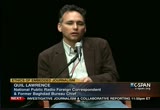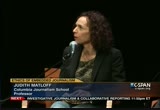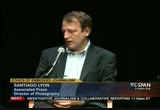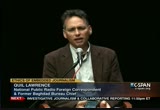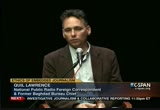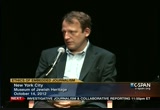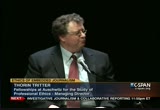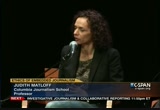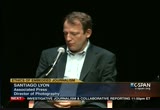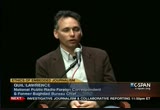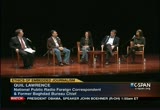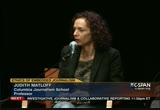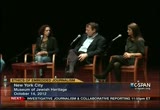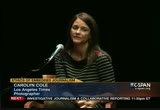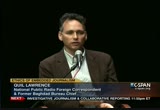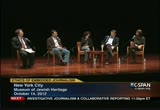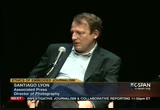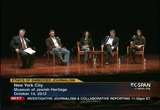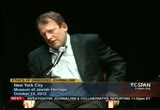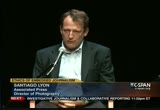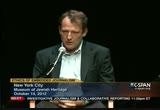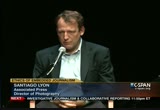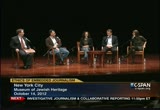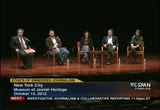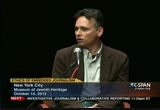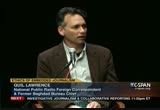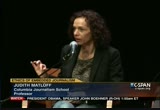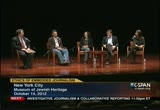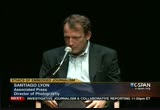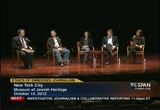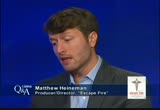tv Ethics of Embedded Journalists CSPAN November 10, 2012 11:00pm-11:55pm EST
11:00 pm
competition is open to students in grades 6-12. for complete details and rules, go online to studentcam.org. >> with reporters and photo journalists on the role of embedded journalists. they described their experience working as embedded journalists in countries such as afghanistan, iraq and columbia. this is about 50 minutes. >> thank you for the introductions.
11:01 pm
i would like to thank you in advance. we are talking about the ethics of journalists. i am not a journalist. i am a historian. so could we start with what do you guys call this? do you refer to being embedded as -- how do we talk about this? >> i am embedded. yes. >> you do not say, i am on an embed. >> an embed means -- you could be with the military and not be embedded. i think it's a term of art now.
11:02 pm
it meansi signed a contract with the military. as far as i know, this is pretty much invented by the military and all this terminology, before that, you would just say, i am reporting with the army. >> there is an indication with embedded that you are living with them and you have shelter, food, and are with them. >> you can rely on them for food and security. we only refer to embeds as far as the military. >> it is about journalists who are working during world war ii.
11:03 pm
11:04 pm
operations. i think the invasion of panama raised it again because, while it was supposed to have imbedded journalists, it was a fiasco and they were held on the base for many days. that prompted much discussion between the press and the pentagon about what to do for the next conflict. ground rules were agreed upon. in 1991, that is when it was instituted again. the difference in that conflict is it was instituted on a pool basis. camera people, journalists who were embedded with the military
11:05 pm
were expected to share all of their material with all of the other major outlets. that created a pool operation to handle all of their content. that morphed in the events after 9/11 into an embedded situation that was not pooled. >> when we first heard ramping up to 2003 the afghanistan invasion, the u.s. troops on the special groundwork special forces. it was such a small force. the issue really came up again in 2002 as people were preparing to embed in iraq. i heard about it and many of my
11:06 pm
peers already in the field thought, no way, we will not do that. our impression of the 1991 embeds is that they were stuck in a room and could not get anything done. a lot of us chose not to embed and many of us went to iraq into the north. i would say we were shocked and appalled at how much play the embedded reporters were getting. there were good stories being reported. they were reported well. it worked so well i felt like i was worried news organizations would start just sending embeds and not reporting the other side. class with the security system, a basically became like that. with iraq, it got to the point where you could not be in unilateral anymore. in afghanistan, that is typical. >> that is the term for
11:07 pm
non-embedded. unilateralist. >> you are unilateral. >> what was important for me in the iraq war was working for the l.a. times we had people and bedded and non-embedded people. we had three or four photographers. you could not go from one side to the other. in other conflicts, you can move from one side of the conflict to another side of the conflict. what was important was having people on both sides. >> what happened both in iraq and afghanistan after a time was that it became very hazardous to have non-arab or
11:08 pm
non-iraqi journalists. there was an increasing reliance on iraqi or arab journalists to be able to tell the other side of the story. the unilateral side. >> i am sure all of you have many stories. could we get to some of the ethical issues? were there situations where you came across an ethical dilemma and you look back on it today and you think about it still? >> i can think of one fairly recently. we had a photographer embedded
11:09 pm
with the marines in afghanistan a couple of years ago now. she captured a scene on her camera of a mortally wounded u.s. marine corporal. the rule of the embed state was if you photograph a wounded combatant, you must get their permission to use imagery of them. if you photograph people who ultimately die, you must wait until their families had been notified before you can use that imagery. in this particular case, the corporal, his name was joshua, was fatally wounded. he was being attended to by medics. he subsequently died in a field hospital. we waited for his family to be notified. once they had been notified, we decided to not just run the
11:10 pm
picture in isolation, but to do a whole series of reports about who he was, personalize his story, humanize his story, we went up and spoke to his family. where he came from, what his relations had been, his father was a career marine, and we ultimately made the decision we would use this picture in that context. it included the journal exurbs from the photographer's journal. the reaction was for us to not. prior to releasing the information his family made a question that we not -- the secretary at the time called up our president and c.e.o. at the time and asked that we not thrun information. we thought, after much consideration, that it was in the public interest to humanize a story that is often reduced to casualty figures in a newspaper on a website.
11:11 pm
ultimately, we decided to run the information. we created a tremendous amount of controversy about, was that the right thing to have done? what were the consequences? they flow in the face of the family's wishes and the secretary of defense's wishes. we felt and still feel it was the correct thing to do, but it was clear the a subject that caused a lot of debate. >> it is very awkward because you bond with these people. you can be with them for a couple weeks. they are feeding and protecting you. you hear their stories and their shattered dreams and they tell you about their families and you bond with them. then you see something you feel needs to be recorded that puts them in a bad light.
11:12 pm
you may go ahead and record it, but it always feels like a sense of being slightly dirty. they do not college and embed their, they just call it reporting with the colombian military. i had to go with them because it was where there was fighting. that is the traditional territory. they like to kidnapped journalists. you really cannot go with them. i did not have excellent contact with them. with the military. one day, there is a day off, and they have a barbecue. they play this music. it is mexican music that glorifies the drug traffickers. these soldiers i was with in colombia were trying to wipe out the trade. that is one of the reasons they were fighting. it was an incredible irony.
11:13 pm
i felt dirty about putting this in a magazine piece. it was the right thing journalistically. these guys trusted me enough they felt they could play this music in front of me. you are constantly self-questioning yourself when you are on one of these things. am i leaning too much in their favor? am i being too hard on them? i constantly feel i am examining, am i doing the right thing. >> some situations, you could sit down and argued the ethics of it. sometimes, you know the right thing to do but you feel uncomfortable. i was embedded with some strikers in an armored vehicle in northern iraq in 2005. i had been out with a different company every day for a couple weeks. you want to be friendly, you
11:14 pm
want to establish your report. you write it as you saw it. sometimes it is less than warm. watching some of these guys abuse a detainee in iraq. it was not a horrible offense that he committed. i saw them roughed him up. i reported it but i felt uncomfortable about it. i was not said it was also the same day i was slated to leave. the report came out after i left. that is the way the timing worked out. it puts you in an awkward situation with another embed. going door-to-door patrol with troops as they do a search. a close up a block and searched every house. there i was, still bartending
11:15 pm
to be an impartial reporter and i parted to these people's houses after nightfall with a bunch of american troops. in the 10 minutes allowed, before we move onto the next house, i have to explain, i am not with them. i am a journalist, not a soldier. what do you think about the trial of saddam hussein? give me your honest opinion. do not mind the marines. it is silly. there were a couple of years there where that was as close as i could get to talking to civilians. >> the largest embed i went on was in 2004 in iraq. my father was a former navy captain. i had respect for the military even before i went on my embed.
11:16 pm
when you are on the embed, you rely on soldiers for your own safety. any measures to take, you are taking away from a gunman. you are aware of that when this is happening. i also know the reason i am there is as the eyes of the american public. i have always gone ahead and taken the picture. i did get kicked out of an embed because there were three or four americans being killed and they were brought into the medic area. i tried to photograph that. i was basically expelled. luckily, the marines took me on and i was able to complete that embed. the other issue that came up during that was that the final days of the battle, the marines were right on the front line
11:17 pm
and they could get into a situation where they are running out of food and water. i was in a situation where i did not want to take any food and water away from the other soldiers who were there. it became a little bit of a problem for me. those are the issues that have come up. >> it raises an interesting point. we refer to the military as some sort of monolithic organization that is identical throughout. there are personalities and attitudes and different branches of the service have different attitudes toward different things. you will find reactions will vary. the situation i mentioned, the colonel in charge was fine with it. other people were not fine with the above and below him. it varies. everybody has his view. even policies can be
11:18 pm
interpreted and implemented in different ways. >> the other thing is that for a photographer, unless you are in the most forward position, in the most dangerous position, you are not really showing what is going on at the most critical point of war. you are always pushing to get to the front line. you cannot be in a back position and expect to cover the story. >> the risks are very real. we have had a couple of cases in recent months and years where photographers, a photographer was on a strike and lost one of its legs. more recently, from "the new york times", a man lost both his legs. it is a very -- while you enjoy some level of security and
11:19 pm
safety because you are with armed individuals who have very highly developed medical evacuation facilities and all of that sort of thing, that stuff can still happen to you and sometimes does. >> would you say that serving as an embedded journalist is safer than being not embedded? >> safer from kidnapping. less safe from gunfire. >> if a man had been without a medic he would have died.
11:20 pm
>> that is what happened, there was no medical attention for journalists. >> i felt like it has evolved around me in the last year. in afghanistan, early on, the places i drove without even having a flak jacket in the car, that kind of thing, would really terrify me now. the same sort of thing with being, getting into northern iraq and waiting for the war to start and realizing how far we were from a decent medical care, which we had to discover a couple of times. there were a lot of legal concerns about a to the point where now, the last embed i did was in the spring and i was going in there with gear that was similar to what the troops were carrying, up to a personal first-aid kit that had very advanced medical gear in it.
11:21 pm
>> you raise an issue about some kind of reaction getting kicked out of embed. i am wondering if any of you have faced any kind of pushed back from the work you have done when being embedded. >> the people who take you on still expect you to write something positive. there is that expectation on their part. among some people. it really varies unit to unit. going out with the military in the early 1990's, because it was the only way to get access to the fighting in that country, they are getting very upset with the reports i was writing because it did not put them in a very positive light. you take somebody, you have to
11:22 pm
accept they will write what they see. a lot of times, people do not expect that to happen. >> we have interesting situations in afghanistan last year where we were allowed to put photographers on to medical evacuation helicopters whose job it is to go into the battlefield and scoop up wounded and dead combatants from both sides. the reaction in some of those scenarios and talking to the photographers, on a couple of occasions, the photographers were attacked physically by soldiers who were delivering their dead colleagues to be evacuated. we captured the most horrific images of the corpses of american military in all different states of damage. in those cases, we make judgment calls about what was acceptable and what we wanted to put out and how valuable it was to tell a story in the heat
11:23 pm
of battle, a things get quite dramatic. the reactions are not always measured on either side. >> the embed contract you signed, i have not read one carefully for some time, because i think everybody understands if you sign this, you will do your job. if you cross a line doing your job, and they think you violated the contract, you'll probably not get on another embed. the thing they require you to sign up to, not giving away positions, they are nothing you would ever really do. a few people have slipped up, but it is never really is essential to the reporting. you come up with people who will not get this embed. it is very tricky. in order to get to the front, it takes days. "why have you not filed in a
11:24 pm
week?" "i have been sitting in a helicopter." when you finally get out to do reporting, it often takes days or weeks to get back. they have an ability to deny that. in the summer of 2009, when news got pretty bad, someone stepped on an ied. we're all talking about the news was decided that it was not good. some are very forward leaning on embeds and want to get the story out whatever it is.
11:25 pm
others feel as though this is just one more weapon in their arsenal in the war of public perception and the use it. >> the issue spoke a lot of colleagues. a tremendously experience and brave and dedicated photographer was always on the sharp end of the stick in multiple conflicts, and a guy like that gets taken out and it was the fear of god into some many people. >> it bothers me sometimes that people do not realize that just because you are reporting on the military that you are anti-american for some reason just because you are trying to do your job showing what is going on in that arena. the fact is is that, as a witness, you are going into all kinds of different situations and you might be on the
11:26 pm
american side, the iraq quayside, and viewers seem to think you are sympathetic, more sympathetic, or less sympathetic, depending on what photograph you take. that has happened to me. they do not look at the journalist as an objective person. >> the program i run deals with journalism ethics and we touched on embedded journalism. can you put this in perspective? are the ethical issues you face as a journalist when you are embedded, are those different and more powerful and more important than the ethical issues you face when you are just doing the rest of your journalism career? >> that is an excellent question. if you look at business journalists, they are often very withholding of information or not aggressive enough with investigating. they have to have the confidence of their sources.
11:27 pm
it is an excellent point you raise because on a certain level, one is always embedded, and you are only as good as your sources. they will not talk to. it is an awkward dance. political reporters face the same thing. they will be frozen out if they write something whatever political person or agency or whatever they are covering does not like what they are doing. it becomes all the more intense and this role when it is an embed because it is life and death and you are living with these people. in pretty tough conditions. >> in conflict situations, the example that comes to mind at some point in iraq, if you recall a group of black water
11:28 pm
security contractors were ambushed and set upon by a mob, killed, and their bodies were burnt and then hanged from a bridge over a river. that was a scene no westerner could get to. we had a photographer, a very brave iraq photographer, who made his way to the scene, took the pictures, was encouraged to leave, and he left. what to do with these pictures? ultimately, we chose to use
11:29 pm
some of the pictures we felt were appropriate and tell the story, but i think the ethical challenges we face as journalists, i would like to think rise above the circumstances under which imagery is gathered. we are trying to make balanced decisions based on the idiosyncrasies of each individual circumstance and each individual situation. i do not think the fact that you are embedded necessarily should skew that too much in one direction or the other. >> it is like having a policeman over your shoulder. you have somebody who is monitoring everything you do and has the ability to control your situation. i know people who have been not take off the embed but told they are no longer welcome to the food and water. that kind of thing. most of my work was abroad in areas where the people i was interviewing, afghan farmers, iraqi shopkeepers, they did not have any of that ability to hold me accountable. the question was was i as good with them ethically as i was
11:30 pm
when i had the kernel ready to throw me off the embed. i would hope i was as respectful to the people who would probably never read what i wrote about them, or there would be no recourse, i hope i treated them with as much respect as i treated the people on the embed where there was accountability. >> the beauty of an embed is it is short. if you are covering business, you are probably covering the same beat for a year or two or longer. i think it doesn't terribly happen but there is not that level of self-questioning that
11:31 pm
a journalist on an embed would indulge in. >> you mentioned before about one of the biggest ethical dilemmas that all journalists face is about when they should intervene. i am wondering if you all have stories about when you face that kind of decision. >> i have plenty. i was on a u.n. plane. the rebels were firing. as we corkscrewed in a to the area, there were bodies everywhere of people who had been hit. without thinking, i hope the guys get people on the plane.
11:32 pm
when we got back to the capital, there were no ambulances in those days and very few people had cars. without thinking, i offered my car to get these civilians to the hospital. i helped a family come to the states. i worked with the u.s. embassy. we really check into them and they were fairly clean. i have gotten people medical aid. i do not think that should be held up as what we should do. i think it is very much an individual decision. i do not judge anybody who does not intervene. that is not our job. it is how you can sleep at night and how you feel about it. i do not think it is our responsibility to. oftentimes, i think people do because a situation moves them or they feel it is the human thing to do. >> i have had those situations like you just mentioned. in the field as a photographer.
11:33 pm
i think at some point, your role as a human being taken over and your role as a journalist becomes secondary. you see somebody who is clearly in need and you are the only person around who can give them the assistance they need to survive, in my case, i have no issue at all doing that. is that my job? no. is that my responsibility as one human being to another? i believe it is. other people might take issue with that and decide not to intervene. it is obviously an individual call. i do not have any problem with doing that and i sleep better at night for having done those sorts of things. there is no one size fits all with these sorts of things. >> i agreed to step in when you are able and there is no one else to help. people forget that usually in
11:34 pm
these conflict situations, there are groups there, other organizations that are there who are helping. it is not all reliant on the photographer, the reporter. if there is nobody around, i will step in. there was a case in haiti where a mob when after a man in retribution with a machete. a group of photographers stepped in to try to calm the situation. there have been many situations like that. if there is something small i can do, that is the least i can do to help people in these kinds of situations. >> you do get into these gray areas. if i am embedded with a unit, will i pass a guy the water. of course. what i pass and first aid materials? of course. what i pass him the ammunition? there is the line. i am embedded with him.
11:35 pm
he is trying to kill the people who are trying to kill him. i have not been in that situation and i know people who have and people who have picked up rifles because they're going to be over run. there is a reason we are journalists and not lawyers appeared we have flexibility there. you have to follow your own conscience. with rebels in colombia, for example, in the time before 9/11, you felt like there was an easier line. i used to go in territory in colombia in the files wearing one of those photojournalist vests, even if i wasn't a photographer, they would know i was a journalist from a great distance appeared i was pretty comfortable in those days that they would not shoot. that was fine. in those days of taliban, al qaeda, in iraq, the insurgents
11:36 pm
in afghanistan, there is really just no impartiality left. do you wear a blue flak jacket or will that make you stand out to the eye of the rifle scope? there are a lot of issues where the line is blurry. >> that is a good point. in the 1980's in central america, the first thing you did was take tape and write letters on your car in big letters. as a journalist, you were afforded some level of respect as a non-competent. those were the days before the internet and for the rapid flow of river mission around the world.
11:37 pm
many of the people whom you were photographing or interviewing had no idea what the results of the work you do work. now, with internet cafes everywhere and access to the internet being increasingly common, the same militiaman you might have come across 20 years ago who would not have a clue what you do, that militiamen today can go down to the local internet cafe and see the results of your work. as a result, the power of information has been increasingly elevated and recognized and i think that has made journalism a more dangerous job than it once was. whether it is journalists being targeted because they are on one side of a conflict or the other war, in the case of many people in countries, journalists being targeted individually because of what they write and the results of the work is out there and more broadly spread for everybody to see. >> i think we are coming toward the end of our time. i want to allow time for questions from the audience. is there a way to provide a
11:38 pm
microphone for anybody who has a question? >> hi. my name is larry. i would like to address my question to you but i did not get your name. everything that was said today was really interesting. i want to take exception to one thing in particular. it is something that basically was glossed over. that is what you said at the beginning. it is about joshua, the corporal. personally, i think what you did was despicable. to use your words, and i will twist them, primarily, you are a journalist, and secondarily, you were looking at it at a human point of view. why?
11:39 pm
it was a matter of sensationalism. you were looking for the journalist story. you got your story. you're not sure what to do. from what i hear, the secretary of defense chose not to run it. the family did not want to do it, forever particular reason. you chose to do it. i hope you are happy with it. i do not know how it was received. i never read it. i hope you are happy with your decision appeared i would love for you to comment. >> thank you. it was a very difficult decision and a very difficult set of circumstances for the reasons you raised. we are dealing with somebody here who, on the one hand, is a son and brother of his family members. on the other hand, we are dealing with somebody who is a public servant. they have enlisted in the u.s. military willingly and they are being paid by taxpayer dollars,
11:40 pm
and they are acting on behalf of the united states government. our thinking was that we should take this story of the corporal who made the ultimate sacrifice for his company and humanize it and put a face on it in order to avoid casualties like him, of which there have been thousands, being reduced to mere statistics. we felt that was very important journalistic thing to do on behalf of our readership around the world. we were very careful.
11:41 pm
11:42 pm
we tried to really give this some context in the overall mission in afghanistan with the reasons i mentioned. i do not think this was sensationalism. quite the opposite. it was an effort to tell a compelling story of somebody who made the ultimate sacrifice for their country in a respectful manner in order to help inform the greater public pier that was our rationale. we understand there are people who take issue with that. not least of all his family and other people such as yourself from what i understand. i think that is part of the debate. we are fortunate in some ways where we live in a society where we are allowed to do that and we are allowed to have that debate. we do not expect everybody to agree with it. far from it. journalistically, i think we
11:43 pm
were and are comfortable with our decision. >> hi. i am sophie. i am wondering how you balance a moral imperative to be unbiased as a journalist when you are in situations where you could immediately have an emotional reaction. it is hard to go into those situations unbiased. anybody. >> i do not think by helping a vulnerable civilian you are necessarily showing a political bias in any way. the point made by my colleague is quite valid that one intervenes when no one else is there to help. you are not intervening every time you go to a refugee camp. it is a very strange situation. it does not mean you are taking political or ideological sides either way. you see a vulnerable child who needs immediate medical attention.
11:44 pm
i do not see how that shows a bias. >> i want to thank you for the dedication in your roles in these important situations. my question is premised on the notion that if you are there embedded or unilateral, do you see ethical dilemmas that are different between the two and is embedding the way to go? >> it has become an essential part of covering these stories. even after the military have taken lumps from us, they are willing to do that when they know they might take more lumps. i should mention i got
11:45 pm
criticism from the other side who say you are just talking about these great american heroes. i think embedding is essential. there were other times where i was embedding primarily to see those parts of iraq i would not normally get to. >> is the premise, do you perturb the situation? it's a valid premise? compare unilateral verses embedded and how that differs or does not. >> it is impossible to be there without a trace. you never say, will you take me
11:46 pm
over there? that has happened on embeds where people have been killed as a result. reporters said, and i am not blaming this reporter, the reporter said, can we go see that? that is a rule i have. this reporter is here, show him around. sometimes i find myself in a truck or on a chopper and suddenly i am saying, are you just taking me over there for me? this is not an actual mission? it is impossible. on the other side, you are involving iraqis or afghans or wherever you are, those people taking you there, they may be people you have hired to take you there. everyone has an agenda. you try your best.
11:47 pm
>> sometimes what i notice in africa working with very undisciplined militias and what not, particularly in south africa with the barricades in the early 1990's, people would play with the cameras. bbc really struggled with this. the cameramen would just put down their cameras and say, it you are playing with the cameras and we will not your accomplices. when you are on embed, and any type of reporting, unilateral or embedded, you are constantly analyzing what your role is and how your reaction to the situation is and how other people are reacting to you. >> that is your job. to try to distinguish what is real and not real. it is a case by case situation. you are watching a situation evolve and you are watching all of the people in that situation relating there and it is up to
11:48 pm
you in those situations where it does not look real. >> thank you. can you talk about how the soldiers you know have responded to you? >> he is as pretty happy somebody gives a damn. "thank you for coming out here." i have been out there for two weeks. you have nine months to go. i have been two units who have recently been burned by a journalist. it was very frosty. i found there was a lot of monotony. a lot of times they were happy to have somebody to talk to or
11:49 pm
grateful someone is out there seen what they do and they will get their name in the paper or on the radio and they are just happy because a lot of them feel like no one back here -- there are thousands of u.s. troops in afghanistan right now. once i have talked to feel forgotten by a lot of the population. they are glad somebody will send a note home. >> sometimes they are genuinely surprised. "you do not have to be here? you are here of your own free will? are you crazy?" the work they are doing is often thankless and anonymous. they are glad on occasion to have it recognized in some small way. or some large way. >> we have reached the end of our time. i would like to take a moment to thank our panelists.
11:50 pm
thank you very much for your comments. i would like to remind you all that the issues touched on here are also issues that resonate with the exhibition upstairs. just a plug for my own program, if you know some journalism graduate students, please encourage them to apply. these are some of the issues we talk about in the context of the holocaust when we are traveling to poland, to germany, going to auschwitz and talking about, what kind of graphic images could you show? what does the journalists have a responsibility to cover? these are the same kind of issues we get to. i hope you send some students my way. thank you very much. [captioning performed by national captioning institute]
11:51 pm
>> on news makers president for americans or tax reform discusses the fiscal cliff and revenue in the lame duck session. we've placed this game of which he is with the exact same people around the board and the board exactly the same as two years earlier and we extend tax cuts two years. oh no the world is going to end, bring my smelling assault, we've been through this. and obama started huffing and puffing let the where is sergea yates today? >> we ended up following him after this plane ride for many
11:52 pm
months as i said, and he entered himself into a program at walter reid where they used accu puncture and meditation and other techniques to wean him off the drugs he was on. and through this program he was able to walk out on his own two feet. so i really commend the military for two things. for one, allowing us to tell this story, both the good and the bad. but for recognizing this problem by recognizing that there is this problem of overmedication and they are looking for outside the box ideas of how to fix it. that's the whole thees sis of the film t. met foreof escape fire is the status quo isn't working and we need outside the box ideas. >> producer of escape fire, the fight toesque america's
11:53 pm
healthcare. on c-span q and a. >> recently there was a discussion on the journalism industry. panelist assess the current and future state of the news industry focusing on investigative reporting. this is an hour and 15 minutes. thank you all very much for being here tonight. thanks to cal humanities for making this possible. the topic is inspired by the jefferson quote about the price of freedom and liberty. jefferson s
169 Views
IN COLLECTIONS
CSPAN Television Archive
Television Archive  Television Archive News Search Service
Television Archive News Search Service 
Uploaded by TV Archive on

 Live Music Archive
Live Music Archive Librivox Free Audio
Librivox Free Audio Metropolitan Museum
Metropolitan Museum Cleveland Museum of Art
Cleveland Museum of Art Internet Arcade
Internet Arcade Console Living Room
Console Living Room Books to Borrow
Books to Borrow Open Library
Open Library TV News
TV News Understanding 9/11
Understanding 9/11
